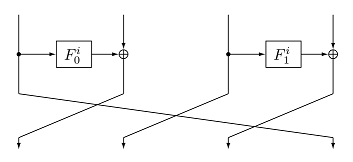Yes, it should be possible. There are 2 easy ways that I am aware of.
Blowfish is a 64-bit block cipher based on a Feistel structure with a 32-bit F function. This can be extended to a 4 branch design to operate on a 128-bit block quite easily. There would need to be a slight change to the key schedule to distribute the round keys properly, either by performing the key expansion twice on each key half, or by producing more round subkeys. CLEFIA is another block cipher with a 32-bit F function and a 4 branch design, and has been shown to be secure in practice.

The other way is to perform encryption on 64-bit blocks in parallel, and perform some kind of 128-bit mixing operation at regular intervals, such as a large matrix multiplication every 4 rounds. This will redistribute bits between the blocks. Key schedule modification may be necessary to prevent certain undesirable properties when weak keys are used. This method requires a new primitive operation to be used, and that may be infeasible or undesirable.
Additional rounds or slight changes to the key schedule may be required for any form of extension in block size based on a smaller primitive, due to the diffusion rate per round, and how the key schedule is implemented. There are of course more ways to extend the block size, but these 2 have been used in other cipher designs successfully. Other methods may be secure, but with certain limitations.
Other block ciphers that are not based on a Feistel structure require other methods of block size extension. Those methods may have security and performance limitations that can only be overcome by using a cipher designed for the target block size.

